A list of books on peace and security, recommended by staff at the International Peace Institute:
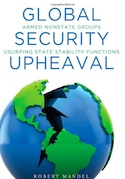 Global Security Upheaval: Armed Nonstate Groups Usurping State Stability Functions, by Robert Mandel (Stanford University Press)
Global Security Upheaval: Armed Nonstate Groups Usurping State Stability Functions, by Robert Mandel (Stanford University Press)
This book challenges the assumption that central governments are always a source of stability, while nonstate armed groups are inherently forces of instability. Mandel argues that at times it can actually be counterproductive to rely on state governments for stability, depending upon the character of the government and the security situation. Following his past work on transnational organized crime, Mandel shows how armed nonstate groups can provide local stability better than weak state power, and he shows how cooperation between states and armed nonstate groups may at times be fruitful. The book provides a novel analysis of the nature of stability and the transformation of global security. It concludes with a series of policy guidelines on how to approach nonstate armed groups in the future. Suggested by Adam Lupel, IPI Editor and Senior Fellow.
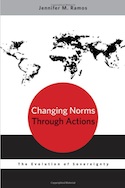 Changing Norms Through Actions: The Evolution of Sovereignty, Jennifer Ramos (Oxford University Press)
Changing Norms Through Actions: The Evolution of Sovereignty, Jennifer Ramos (Oxford University Press)
The principle of the responsibility to protect has rekindled long-held debates about the status of sovereignty. One side holds state sovereignty to be inviolable, and one side holds it to be conditional, including both rights and obligations. In this book, Jennifer Ramos takes a more nuanced look at the sovereignty debate. She examines how the sovereignty norm has evolved over time, and she argues that you can trace its development in relation to the result of actions taken on its behalf. For example, whether an intervention is seen as a violation of sovereignty or not, depends greatly on the military outcome, and she argues this can have a profound effect on international normative commitments in subsequent crises. Through the analysis of conceptions of sovereignty before and after crises related to counterterrorism, human rights, and weapons of mass destruction, Ramos provides insight into how political action shapes international norms change over time. Suggested by Adam Lupel, IPI Editor and Senior Fellow.
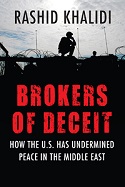 Brokers of Deceit: How the US Has Undermined Peace in the Middle East by Rashid Khalidi (Beacon Press, 2013)
Brokers of Deceit: How the US Has Undermined Peace in the Middle East by Rashid Khalidi (Beacon Press, 2013)
Mr. Khalidi, Edward Said Professor of Modern Arab Studies at Columbia University, examines historical moments during the Israeli-Palestinian peace process to reveal why he believes the American-brokered negotiations have not only failed but have undermined progress towards lasting peace. Suggested by Warren Hoge, Senior Adviser for External Relations.
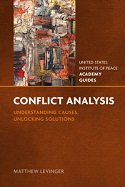 Conflict Analysis: Understanding Causes, Unlocking Solutions by Matthew Levinger (US Institute of Peace Press, 2013)
Conflict Analysis: Understanding Causes, Unlocking Solutions by Matthew Levinger (US Institute of Peace Press, 2013)
Finally, in one volume, the theoretical underpinning and the tools to understand today’s conflict dynamics and develop policy responses. This handbook aims to help practitioners of conflict management in analyzing both the causes of conflict and peace, and to include their analysis in decisionmaking and program implementation. A very timely toolbox in an age of shifting global conflict trends that can enable policy makers to design more nuanced and agile responses to the early 21st-century complex conflict crises. Suggested by Francesco Mancini, Senior Director of Research.
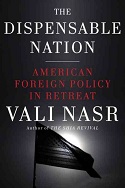 The Dispensable Nation: American Foreign Policy in Retreat by Vali Nasr (Doubleday, 2013)
The Dispensable Nation: American Foreign Policy in Retreat by Vali Nasr (Doubleday, 2013)
Questioning what he calls America’s dangerous choice to engage less in the world, Mr. Nasr, dean of the School of Advanced International Studies (SAIS) at Johns Hopkins and a former member of the Obama State Department, delivers a sharp indictment of the president’s foreign policy and charts a path forward for how the US can regain lost influence and compete with its chief rival, China. Suggested by Warren Hoge, Senior Adviser for External Relations.
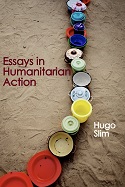 Essays in Humanitarian Action by Hugo Slim (Oxford Institute of Ethics, Law and Armed Conflict and Kindle Books, 2012)
Essays in Humanitarian Action by Hugo Slim (Oxford Institute of Ethics, Law and Armed Conflict and Kindle Books, 2012)
This collection of essays, written between 1996 and 2005 by a leading humanitarian scholar, provides food for thought on some fundamental tensions underlying humanitarian ethics and practice. As humanitarian action needs to adapt to a fast-changing world and faces recurrent challenges from Syria to Mali and Somalia, the book offers timely and badly needed reflection on humanitarian values and dilemmas. Suggested by Jeremie Labbé, IPI Senior Policy Analyst, Humanitarian Affairs.
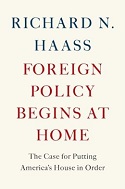 Foreign Policy Begins at Home: The Case of Putting America’s House in Order by Richard N. Haas (Basic Books, 2013)
Foreign Policy Begins at Home: The Case of Putting America’s House in Order by Richard N. Haas (Basic Books, 2013)
Arguing that America is underperforming at home and overreaching abroad, Mr. Haass, president of the Council on Foreign Relations, explains that America’s continued influence and leadership in the world is contingent upon its ability to confront pressing challenges at home and progress in a 21st-century “nonpolar” world of American primacy but not domination. Suggested by Warren Hoge, Senior Adviser for External Relations.
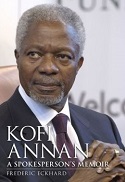 Kofi Annan: A Spokesperson’s Memoir by Frederic Eckhard (Ruder Finn Press, 2012)
Kofi Annan: A Spokesperson’s Memoir by Frederic Eckhard (Ruder Finn Press, 2012)
Mr. Eckhard, spokesperson for Secretary-General Kofi Annan from 1997 to 2005, provides an insider’s account into the life and career of Mr. Annan, who won the Nobel Peace Prize in his first term and then had to spend much of his second term defending himself and the world body against intense media criticism of his management of the UN in the aftermath of the oil- for- food scandal. Covering some of the most decisive turning points in international diplomacy, the book offers a candid look into the interworkings of the UN and its relationship with the public. Suggested by Warren Hoge, Senior Adviser for External Relations.
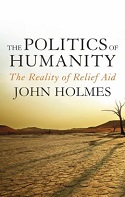 The Politics of Humanity: The Reality of Relief Aid by John Holmes (Head of Zeus, 2013)
The Politics of Humanity: The Reality of Relief Aid by John Holmes (Head of Zeus, 2013)
The author, former UN Under Secretary-General for Humanitarian Affairs from 2007 to 2010, gives a candid account of the three years spent at the helm of the international humanitarian system. From South Sudan to Afghanistan, and from Somalia to Haiti, he depicts the challenges faced by humanitarian agencies in some of the hottest spots on the planet, and draws reflections that remain fully relevant to humanitarian action today. Suggested by Jeremie Labbé, IPI Senior Policy Analyst, Humanitarian Affairs
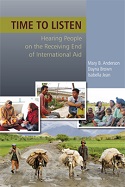 Time to Listen: Hearing People on the Receiving End of International Aid by Mary B. Anderson, Dayna Brown, and Isabella Jean (CDA Collaborative Learning Projects, 2012)
Time to Listen: Hearing People on the Receiving End of International Aid by Mary B. Anderson, Dayna Brown, and Isabella Jean (CDA Collaborative Learning Projects, 2012)
Co-written by the author of the seminal book “Do No Harm,” this publication is the outcome of an unprecedented study that looked at how aid is perceived at the receiving end of international assistance. Based on more than 6,000 interviews conducted across 20 countries, the study concludes that international aid generally fails to meet expectations of aid-recipient communities. While punctual assistance is usually appreciated, the cumulative impact of aid has too often unintended negative effects. The book provides important recommendations on how to reform the aid system to make it more in tune with expectations and needs and accountable to recipients. Suggested by Jeremie Labbé, IPI Senior Policy Analyst, Humanitarian Affairs
 The Yellow Birds by Kevin Powers (Little, Brown and Company, 2012)
The Yellow Birds by Kevin Powers (Little, Brown and Company, 2012)
Written by a veteran of the war in Iraq, this novel tells the story of two soldiers deployed to Iraq who try to stay alive during the bloody conflict. Suggested by Maureen Quinn, Director of Programs.
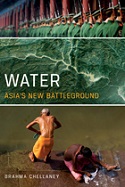 Water: Asia’s New Battleground by Brahma Chellaney (Georgetown University Press, 2011)
Water: Asia’s New Battleground by Brahma Chellaney (Georgetown University Press, 2011)
This book recently won the 2012 Asia Society Bernard Schwartz Book Award for its outstanding contribution to advancing the understanding of contemporary Asia. Dr. Chellaney describes water stress as Asia’s defining crisis of the 21st century, creating obstacles to continued rapid economic growth and exacerbating long-time territorial disputes and inter-state tensions over shared resources. Since Asia’s booming population and economic development are increasing the demand on food and agriculture, water’s demand is only bound to grow. Additionally, many of Asia’s water sources cross national boundaries, and as less and less water is available, international tensions will rise. The book concludes with strategies to de-escalate tensions and avoid conflict in the region over water resources. Suggested by Francesco Mancini, Senior Director of Research.




